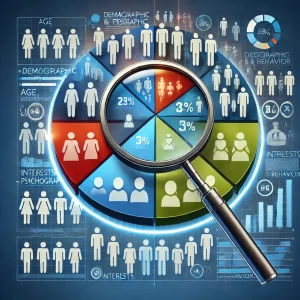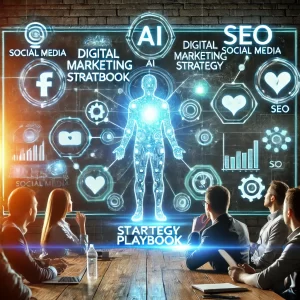Building a Resilient Digital Marketing Strategy
Digital Strategy for the Modern Economy
Building a Resilient Digital Marketing Strategy
Introduction
![]() In the ever-evolving digital landscape, having a solid marketing strategy is no longer optional—it’s essential. Whether you’re a seasoned entrepreneur or just starting out, building a resilient digital marketing strategy is crucial for achieving long-term success. But what does it take to create a strategy that not only adapts to market trends but also stands the test of time?
In the ever-evolving digital landscape, having a solid marketing strategy is no longer optional—it’s essential. Whether you’re a seasoned entrepreneur or just starting out, building a resilient digital marketing strategy is crucial for achieving long-term success. But what does it take to create a strategy that not only adapts to market trends but also stands the test of time?
In this blog, we’ll walk you through the key components of a successful digital marketing strategy: identifying and targeting the right audience, leveraging various digital marketing channels, and measuring and optimizing performance. Plus, we’ll give you an inside look at the Wealth Creation Mastermind’s social media advertising campaign strategy, designed to help our community members market their personal brands and promote our course, Mastering the Art of Wealth Creation: A Journey Through Mind Power and Marketing.
In addition to breaking down the essential components of a resilient digital marketing strategy, it’s important to recognize the broader role digital marketing plays in shaping the future economy. As discussed in our previous blog, The Future of Jobs in the Age of Clean Disruption, digital marketing is more than just a trend—it’s a foundational force driving how businesses grow and adapt in a rapidly changing landscape. If you’re wondering why so many entrepreneurs are turning to digital marketing, be sure to revisit Why Personal Digital Marketing Businesses Are the Future, where we delve into the unparalleled opportunities available to those looking to create scalable, profitable online businesses. These insights will give you a deeper understanding of how to position your strategy for long-term success.
Who Needs a Digital Marketing Strategy?
In today’s increasingly digital world, the short answer is: everyone. Whether you’re a small business owner, an entrepreneur, or a large corporation, having a well-defined and flawlessly executed digital marketing strategy is essential to staying competitive. A strong digital presence allows you to engage with your audience, build trust, and ultimately drive conversions. But who specifically benefits the most from a digital marketing strategy? Let’s take a closer look.
1. Entrepreneurs and Small Business Owners:
For small business owners and entrepreneurs, a digital marketing strategy provides a way to level the playing field with larger competitors. It enables them to target the right customers, scale their business, and generate more revenue without the traditional overhead costs of physical advertising. By using channels like social media, content marketing, and email, entrepreneurs can attract a broader audience, establish authority, and create brand loyalty on a limited budget.
2. Network Marketers:
Network marketers are especially well-positioned to benefit from a digital marketing strategy. Historically, network marketing has relied heavily on personal relationships and face-to-face interactions. However, the rise of social media and digital tools has revolutionized the industry, enabling network marketers to reach a global audience without leaving their homes. By implementing a digital marketing strategy, network marketers can automate parts of their business, generate leads through inbound marketing, and create engaging content that showcases their products or services. As we’ve covered in previous posts like The Role of Digital Marketing in the New Economy, this shift allows network marketers to blend personal relationships with the scalability of digital platforms, opening up new possibilities for growth.
3. E-commerce Businesses:
For e-commerce brands, a digital marketing strategy is the lifeblood of the business. From search engine optimization (SEO) to drive organic traffic, to social media ads that target specific buyer personas, e-commerce businesses rely heavily on digital strategies to increase sales and brand awareness. Without a robust digital marketing plan, e-commerce companies would struggle to compete in a saturated marketplace.
4. Personal Brands:
Building a personal brand has never been more important, especially in the age of influencers, freelancers, and solopreneurs. A well-crafted digital marketing strategy allows individuals to showcase their skills, expertise, and personality across various online platforms. Whether it’s through blogging, creating a YouTube channel, or running targeted ads on LinkedIn, personal brands can grow significantly by reaching a wider audience online.
5. Corporations and Enterprises:
Even large corporations need a digital marketing strategy to remain relevant and competitive in their industries. Consumers now expect brands to engage with them digitally, whether it’s through social media, content marketing, or personalized email campaigns. A digital marketing strategy enables corporations to meet these expectations, build stronger relationships with their customers, and enhance their brand’s reputation.
No matter what industry you’re in or what your business goals are, a digital marketing strategy is crucial to your success. By understanding the unique needs of your audience and utilizing the right digital tools, you can scale your business and adapt to the evolving digital landscape. For network marketers, entrepreneurs, and small business owners in particular, the opportunities to harness the power of digital marketing have never been greater.
Identifying and Targeting the Right Audience
 The foundation of any successful marketing strategy is understanding who you’re speaking to. Identifying and targeting the right audience is critical to ensure your message resonates and drives conversions. Here’s how to get started:
The foundation of any successful marketing strategy is understanding who you’re speaking to. Identifying and targeting the right audience is critical to ensure your message resonates and drives conversions. Here’s how to get started:
1. Develop Customer Personas:
Begin by creating detailed customer personas that reflect your ideal clients. Consider demographic factors such as age, gender, location, and income level, but don’t stop there—dive deeper into their behaviors, interests, challenges, and pain points. These personas will help you craft tailored marketing messages that resonate on a personal level.
2. Understand Your Audience’s Online Behavior:
Once you have a clear idea of who your audience is, identify where they spend their time online. Are they on Facebook, Instagram, LinkedIn, or Pinterest? What type of content do they engage with—blogs, videos, infographics, or social media posts? Knowing these details will help you decide which channels to focus on.
3. Segment Your Audience:
Not all of your audience will have the same needs. Segment your customer base into groups that require different approaches. For instance, one segment may be new to your brand and need introductory content, while another may already be familiar with your services and looking for advanced insights.
With the Wealth Creation Mastermind community, we teach our members to focus heavily on understanding their target audience before launching any marketing campaigns. This allows them to hone in on their message and increase engagement and conversion rates.
Using AI to Empower Your Performance
In today’s digital marketing landscape, artificial intelligence (AI) is playing an increasingly significant role in helping businesses better understand and engage with their target audience. AI-powered tools like ChatGPT are becoming invaluable resources for marketers looking to identify their ideal audience and create highly relevant content tailored to that audience’s needs.
How AI Can Help You Identify Your Ideal Target Audience
One of the most powerful capabilities of AI is its ability to analyze vast amounts of data quickly and provide insights that can inform your marketing strategy. When it comes to identifying your ideal target audience, AI can help by analyzing customer behavior patterns, preferences, and pain points, allowing you to refine your audience segmentation.
For example, ChatGPT can assist by generating questions and strategies that will help you understand your audience better. Here’s how you can use it:
Example Prompts for Identifying Your Target Audience:
1. Understanding Demographics and Psychographics:
•Prompt: “Based on [specific product or service], help me identify the ideal customer by age, gender, income level, and interests.”
•AI Response: ChatGPT can analyze market data to suggest specific demographic and psychographic segments most likely to be interested in your product. You can use this information to refine your customer personas and tailor your marketing messages.
2. Analyzing Customer Pain Points:
•Prompt: “What common pain points might [target demographic] experience in relation to [specific industry/product]?”
•AI Response: The AI will generate a list of common challenges or frustrations your target audience faces, which you can address directly in your marketing content.
3. Understanding Customer Behavior:
•Prompt: “What online behaviors or purchasing habits are typical for [target demographic] when shopping for [product type]?”
•AI Response: ChatGPT can provide insight into how your audience searches for, evaluates, and purchases products online, giving you a clearer understanding of where to focus your efforts.
How AI Can Help You Create Targeted Content
Once you’ve identified your ideal audience, the next step is to create content that speaks directly to their needs. AI tools like ChatGPT are exceptional at helping you craft content that resonates with your audience, whether you’re developing blog posts, social media ads, or email campaigns.
Example Prompts for Creating Targeted Content:
1. Generating Blog Topics Tailored to Your Audience:
•Prompt: “Generate blog post ideas that would appeal to [audience segment] interested in [topic].”
•AI Response: ChatGPT will generate a list of relevant blog post ideas, ensuring that the content addresses the needs and interests of your specific audience. For example, for a fitness product targeting women in their 30s, it might suggest topics like “10 Home Workouts for Busy Moms” or “How to Balance Fitness and a Career.”
2. Writing Social Media Copy for Specific Pain Points:
•Prompt: “Write a compelling Instagram post for [audience segment] addressing their pain point related to [product].”
•AI Response: The AI will generate a short, engaging social media caption tailored to your audience’s pain points. For example, for a skincare brand, it might create a post addressing how the product solves common skincare issues, such as dryness or acne, targeting young professionals who are short on time.
3. Developing Engaging Email Campaigns:
•Prompt: “Write an email subject line and body that will appeal to [target demographic] looking for solutions to [pain point].”
•AI Response: ChatGPT can craft email content designed to attract and engage your audience, highlighting how your product or service solves their specific problems.
AI-Powered Insights for Optimization
AI can also help you continuously refine your content by analyzing how well it’s performing and providing suggestions for improvement. By integrating AI into your content creation process, you can save time, increase relevance, and ensure that your marketing efforts are aligned with the needs and behaviors of your target audience.
Example Prompts for Optimization:
•Prompt: “What changes should I make to my content to improve engagement among [target audience]?”
•Prompt: “Based on [product/service], how can I better highlight my unique selling points to attract [target demographic]?”
By using AI like ChatGPT, you can supercharge your content creation process, ensuring that everything you produce is laser-focused on attracting and converting your ideal audience. Incorporating AI into your digital marketing strategy not only enhances your productivity but also allows you to create content that resonates on a deeper level with your customers.
By leveraging AI in identifying your target audience and creating tailored content, you can ensure your digital marketing strategy is not only effective but also resilient in an ever-changing marketplace.
Utilizing Various Digital Marketing Channels
 A successful digital marketing strategy doesn’t rely on just one method. To reach the broadest audience and maximize your impact, you need to leverage multiple digital marketing channels. Each platform offers unique advantages, and understanding how to use them in harmony is key.
A successful digital marketing strategy doesn’t rely on just one method. To reach the broadest audience and maximize your impact, you need to leverage multiple digital marketing channels. Each platform offers unique advantages, and understanding how to use them in harmony is key.
Here’s a breakdown of some of the most effective channels:
1. Social Media Marketing:
Social media platforms like Facebook, Instagram, LinkedIn, and Pinterest are powerful tools for brand awareness and engagement. With the right strategies, you can use social media to attract a large following, drive traffic to your website, and convert leads into customers.
•Social Media Advertising Campaigns: The Wealth Creation Mastermind members use targeted social media advertising campaigns to promote their personal brands and the course, Mastering the Art of Wealth Creation: A Journey Through Mind Power and Marketing. This campaign is built around ad bundles that run across multiple platforms, creating a cohesive and consistent message. The ads are tailored to each platform’s unique audience, driving higher engagement and conversions. By leveraging AI-powered tools, we optimize these ads for maximum performance.
2. Content Marketing:
Content is still king in the digital marketing world. Creating high-quality, valuable content—such as blog posts, videos, and infographics—helps you establish authority in your niche, attract organic traffic, and nurture leads through the buyer’s journey.
•Blogging: Regularly publishing blog posts can significantly improve your search engine rankings and attract a steady stream of traffic to your site. Be sure to incorporate SEO best practices (more on this later) to maximize the visibility of your content.
•Video Marketing: Video content is one of the most engaging forms of media online. Use platforms like YouTube, Vimeo, or Instagram Stories to share your brand story, explain your products or services, or host webinars and tutorials.
3. Email Marketing:
Email marketing remains one of the most effective ways to build relationships with your audience. Whether you’re sending a welcome series, nurturing leads, or following up after a purchase, email marketing allows you to deliver personalized content directly to your audience’s inbox.
•Use segmentation and automation tools to deliver highly relevant messages based on your subscribers’ behavior. For example, send targeted offers to users who have abandoned their cart or re-engage subscribers who haven’t opened your emails in a while.
4. Search Engine Optimization (SEO):
Ranking high in search engine results is crucial for driving organic traffic to your site. A comprehensive SEO strategy involves optimizing your website for relevant keywords, improving site speed, and creating high-quality backlinks.
•On-Page SEO: This includes optimizing your page titles, meta descriptions, headings, and content for target keywords.
•Off-Page SEO: Focus on building backlinks from reputable sites to boost your authority in the eyes of search engines.
Measuring and Optimizing Performance
It’s not enough to just set your marketing strategy in motion—you also need to continually measure and optimize your efforts to ensure you’re achieving the desired results. Here’s how:
1. Set Clear KPIs:
Start by setting clear Key Performance Indicators (KPIs) that align with your overall business goals. Are you aiming to increase website traffic, generate more leads, or boost sales? Your KPIs will guide your optimization efforts.
2. Analyze Data:
Use analytics tools such as Google Analytics, Facebook Insights, or HubSpot to track the performance of your marketing efforts. Key metrics to focus on include:
•Traffic Sources: Determine which platforms and campaigns are driving the most traffic to your site.
•Conversion Rate: Track how many of your site visitors are converting into leads or paying customers.
•Engagement: Analyze how your audience interacts with your content, ads, and emails.
3. Optimize Your Strategy:
Based on the data you collect, make adjustments to your marketing strategy. This could mean shifting more of your budget to the channels that are performing best, tweaking your messaging to improve engagement, or testing new ad formats.
At Wealth Creation Mastermind, we emphasize the importance of A/B testing in optimizing digital marketing strategies. By running tests on headlines, images, CTAs, and more, our community members continually improve their campaign performance.
Call to Action: Get Hands-On Experience in Building Your Strategy
 Now that you’ve learned the key components of building a resilient digital marketing strategy, it’s time to put that knowledge into action. At Wealth Creation Mastermind, we offer hands-on training and support to help you build and optimize your own strategy.
Now that you’ve learned the key components of building a resilient digital marketing strategy, it’s time to put that knowledge into action. At Wealth Creation Mastermind, we offer hands-on training and support to help you build and optimize your own strategy.
In our course, Mastering the Art of Wealth Creation: A Journey Through Mind Power and Marketing, you’ll gain practical skills in:
•Building a strong online presence.
•Leveraging AI and automation to streamline your efforts.
•Implementing scalable strategies for long-term success.
•Mastering content, email, and social media marketing.
Ready to take control of your digital marketing future? Click here to enroll now and join a community of like-minded entrepreneurs committed to building a lasting digital presence.
•#DigitalMarketing, #MarketingStrategy, #SocialMediaMarketing, #AudienceTargeting, #WealthCreation, #SEO, #MarketingOptimization, #Entrepreneurship, #BusinessGrowth, #PassiveIncome

John Rogers is a former Wall Street portfolio manager and served as CEO of Premium Enterprises and President of The Colorado Tire Recycling Center. He transitioned to digital marketing, founding WealthCreationMastermind.com to empower home-based entrepreneurs with cutting-edge strategies. Creator of the “Mastering the Art of Wealth Creation” online course, John has driven significant growth in network marketing, achieving the Blue Diamond rank and earning the title of Univera Associate of the Year in 2015. His expertise in leveraging technology for financial success transforms how entrepreneurs achieve their business goals.